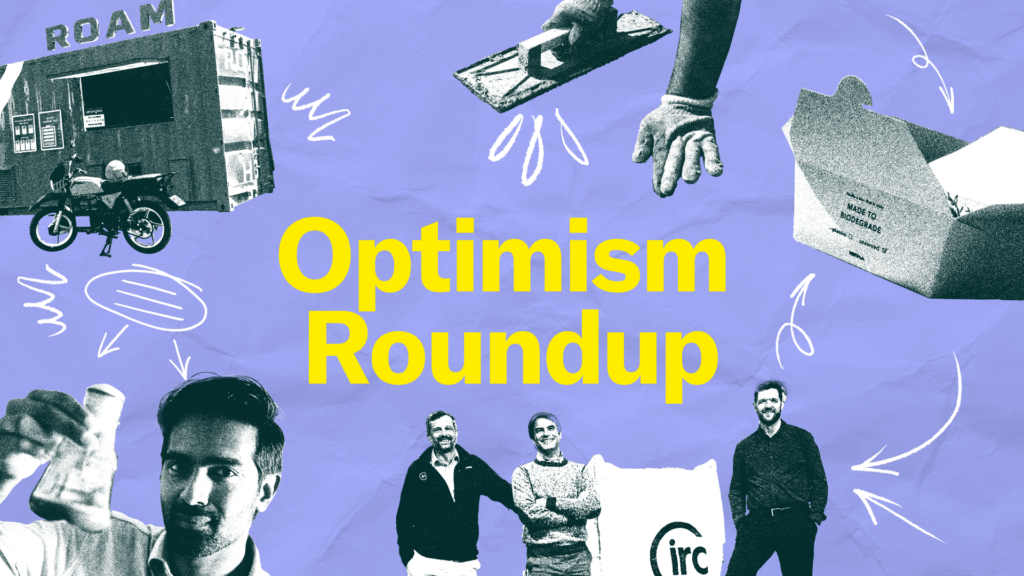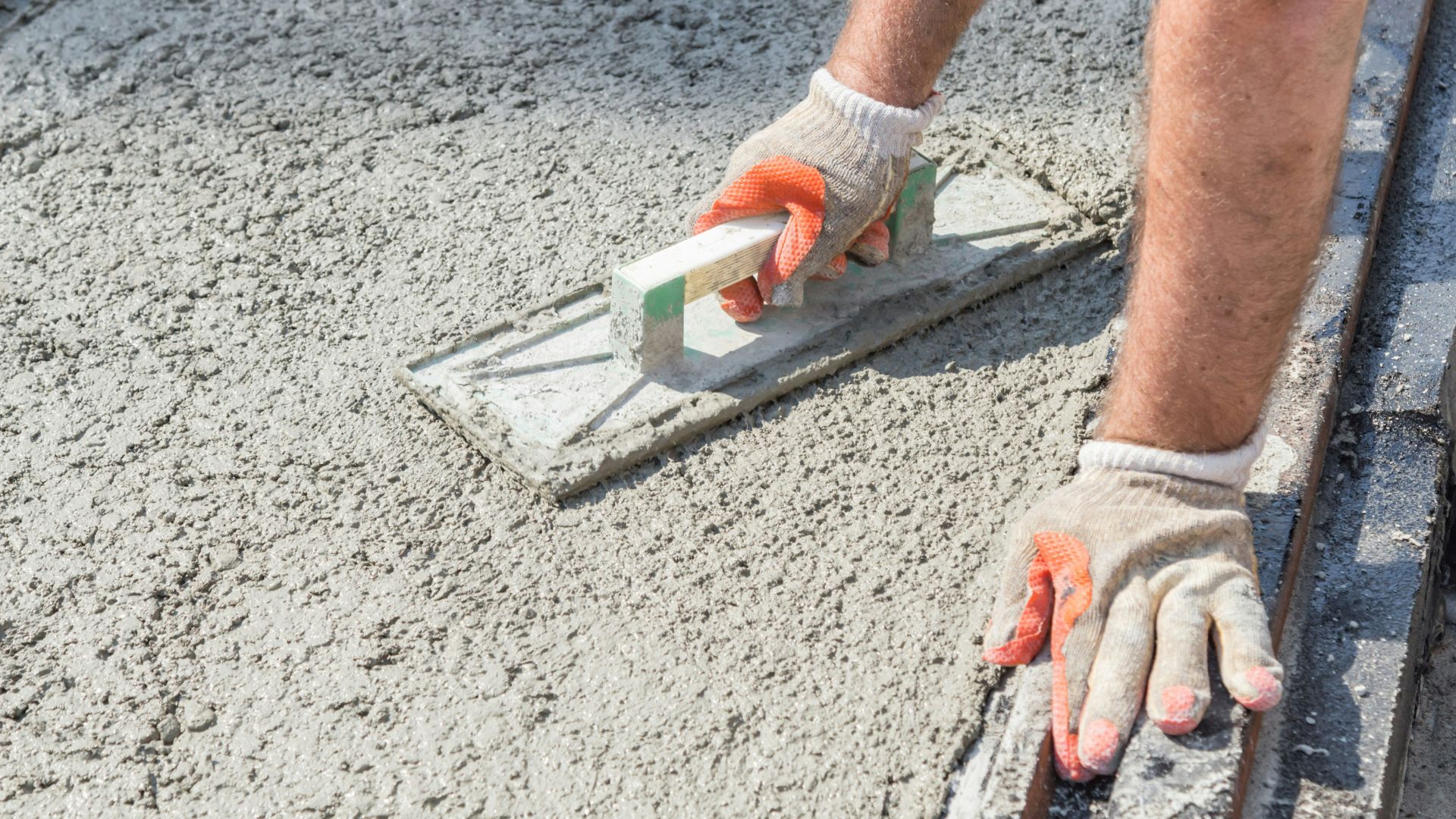

In this Optimism Roundup, see how Earthshot Prize Finalists and Nominees are scaling solutions with real-world impact, from reducing plastic waste to decarbonising construction.
There’s news of Notpla’s seaweed-based packaging landing in IKEA’s Oxford Street café, and Roam breaking records in Kenya as it drives the shift to electric transport. MiAlgae and Circ are expanding with new facilities in Scotland and France to tackle waste, while Microsoft is working with Nominee Sublime Systems to bring low-carbon cement to global construction projects.
Read on for the full stories.
2022 Earthshot Prize Winner Notpla is bringing its pioneering seaweed-based packaging to the café of IKEA’s new Oxford Street flagship in London.
Visitors to the landmark store will be tucking into the famous IKEA meatballs, hot dogs and cinnamon buns, served in takeaway packaging and on trays lined with seaweed instead of plastic. Because the packaging is fully compostable and made entirely from natural materials, the switch is set to prevent tonnes of plastic waste from ending up in landfills.
By reaching millions of customers in one of the UK’s busiest and most high-profile retail destinations, Notpla and IKEA are showing that plastic-free alternatives are not only possible but can fit effortlessly into everyday routines. And with IKEA’s global reach, this sustainable shift has the potential to grow well beyond London and influence how packaging is used worldwide.

2024 Finalist MiAlgae has submitted plans for a large new facility in Grangemouth, Scotland. The project is set to create around 100 green jobs, including retraining opportunities for oil and gas workers looking to move into the low-carbon economy.
The new site is designed to boost production of MiAlgae’s sustainable Omega-3, made by growing microalgae on wastewater from the whiskey industry. This innovative process not only reuses a by-product from another sector but also significantly reduces pressure on wild fish stocks.
With demand for Omega-3 oil rising across the pet food and human health sectors, the expansion will put MiAlgae in a strong position to scale its impact. It’s a clear example of how biotech innovation can cut waste, reduce natural impacts and support a fair transition to a greener economy.

MiAlgae’s sustainable Omega-3, made by growing microalgae on wastewater from the whiskey industry.
2022 Earthshot Prize Finalist Roam has been named Kenya’s fastest-growing company and one of Africa’s Top 40 by the Financial Times.
The Nairobi-based startup is driving Africa’s electric transport revolution with an expanding range of electric motorcycles, buses and charging infrastructure, all tailored for local roads and communities.
Roam’s revenues have grown sixfold in just three years, a clear sign that homegrown innovation is meeting rising demand for clean, reliable transport. By replacing everyday fossil fuel-powered vehicles with electric alternatives, the company is helping bring cleaner air to millions, while also creating local green jobs.
And with no sign of Roam taking its foot off the pedal, the company is charging ahead to bring electric mobility to more people, more places, and a continent ready for change.

Roam has been named Kenya’s fastest-growing company and one of Africa’s Top 40 by the Financial Times.
2023 Earthshot Prize Finalist Circ is investing $500 million to build the world’s first industrial-scale polycotton recycling plant in Saint-Avold, France, aiming to process 70,000 metric tons of blended textiles annually by 2028 .
This expansion cements Circ’s position as a leader in sustainable textile innovation. The facility will create 200 jobs and is backed by the French government and EU, marking a significant step toward a circular fashion economy.
Polycotton fabrics have been a major challenge for the fashion industry for decades. Circ’s patented hydrothermal technology separates polyester and cotton fibres, allowing both to be recycled and reused. Major brands such as Zara and Patagonia have invested in Circ, with its recycled materials already featured in commercial collections.
Will your next outfit be a Circ original?

Circ to build $500 million polyester recycling plant in France
Sublime Systems, an Earthshot Prize Nominee, has secured an agreement with Microsoft to supply up to 622,500 metric tons of its low-carbon cement over the next six to nine years.
How are Sublime reducing carbon emissions? Their process eliminates the need for energy-intensive kilns by utilising an electrochemical method powered by renewable electricity. A more efficient process that is better for the planet.
This partnership enables Microsoft to incorporate Sublime’s sustainable cement into its global construction projects, including data centres and office buildings. By backing this innovative technology, Microsoft is facilitating the scale-up of clean cement production, marking a significant step toward decarbonising the construction industry.

Earthshot Prize Nominee Sublime Systems have signed a deal to supply Microsoft with over 600,000 metric tonnes of low-carbon cement.
Keep an eye on our channels for all the latest stories of positivity from the Earthshot community.
Got some news you want to shout about? Share it with us on social using the hashtag #EarthshotPrize.